人教版新目标八年级下册-英语语法知识点精讲练习
人教版新目标英语八年级下册:Unit 9《Have you ever been to museum》 讲解+练习题目+答案
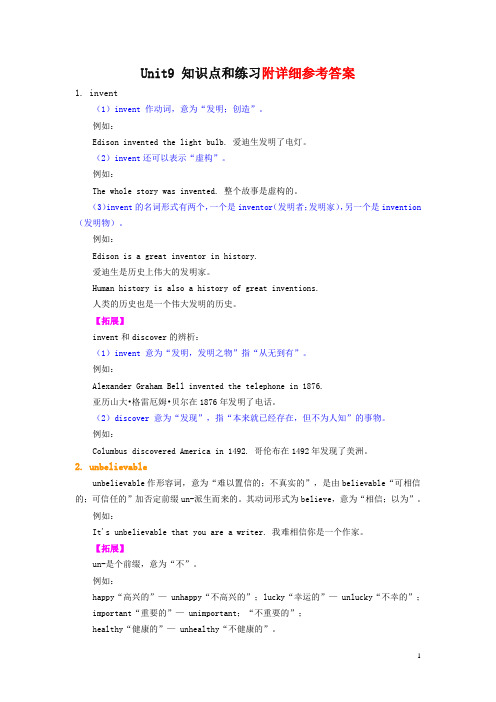
Unit9 知识点和练习附详细参考答案1. invent(1)invent 作动词,意为“发明;创造”。
例如:Edison invented the light bulb. 爱迪生发明了电灯。
(2)invent还可以表示“虚构”。
例如:The whole story was invented. 整个故事是虚构的。
(3)invent的名词形式有两个,一个是inventor(发明者;发明家),另一个是invention (发明物)。
例如:Edison is a great inventor in history.爱迪生是历史上伟大的发明家。
Human history is also a history of great inventions.人类的历史也是一个伟大发明的历史。
【拓展】invent和discover的辨析:(1)invent 意为“发明,发明之物”指“从无到有”。
例如:Alexander Graham Bell invented the telephone in 1876.亚历山大•格雷厄姆•贝尔在1876年发明了电话。
(2)discover 意为“发现”,指“本来就已经存在,但不为人知”的事物。
例如:Columbus discovered America in 1492. 哥伦布在1492年发现了美洲。
2. unbelievableunbelievable作形容词,意为“难以置信的;不真实的”,是由believable“可相信的;可信任的”加否定前缀un-派生而来的。
其动词形式为believe,意为“相信;以为”。
例如:It's unbelievable that you are a writer. 我难相信你是一个作家。
【拓展】un-是个前缀,意为“不”。
例如:happy“高兴的”— unhappy“不高兴的”;lucky“幸运的”— unlucky“不幸的”;important“重要的”— unimportant;“不重要的”;healthy“健康的”— unhealthy“不健康的”。
【人教新目标】八年级英语下册《Unit 3》短语及语法讲义
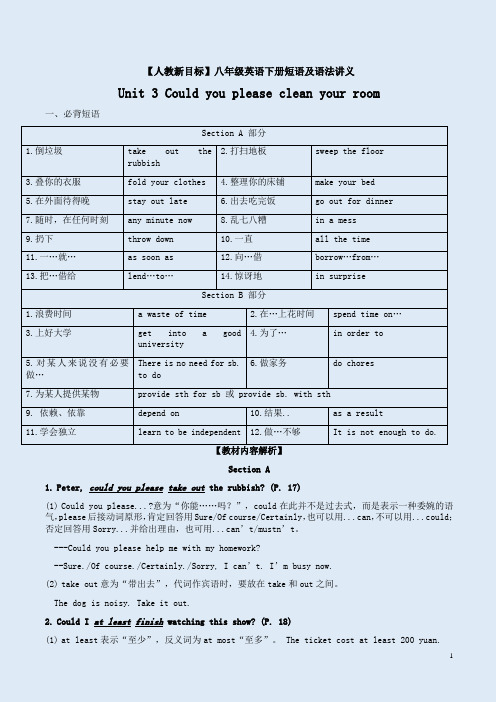
【人教新目标】八年级英语下册短语及语法讲义Unit 3 Could you please clean your room一、必背短语Section A 部分1.倒垃圾take out therubbish2.打扫地板sweep the floor3.叠你的衣服fold your clothes4.整理你的床铺make your bed5.在外面待得晚stay out late6.出去吃完饭go out for dinner7.随时,在任何时刻any minute now8.乱七八糟in a mess9.扔下throw down 10.一直all the time11.一…就…as soon as 12.向…借borrow…from…13.把…借给lend…to…14.惊讶地in surpriseSection B 部分1.浪费时间 a waste of time2.在…上花时间spend time on…3.上好大学get into a gooduniversity4.为了…in order to5.对某人来说没有必要做…There is no need for sb.to do6.做家务do chores7.为某人提供某物provide sth for sb 或 provide sb. with sth9. 依赖、依靠depend on 10.结果.. as a result11.学会独立learn to be independent 12.做…不够It is not enough to do.【教材内容解析】Section A1.Peter, could you please take out the rubbish? (P. 17)(1)Could you please...?意为“你能……吗?”,could在此并不是过去式,而是表示一种委婉的语气,please后接动词原形,肯定回答用Sure/Of course/Certainly,也可以用...can,不可以用...could;否定回答用Sorry...并给出理由,也可用...can’t/mustn’t。
(人教新目标)八年级英语(下)短语语法知识点汇总Unit9
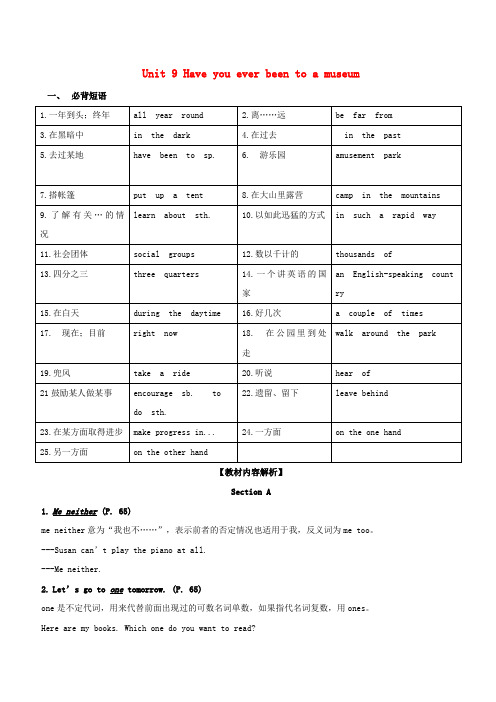
Unit 9 Have you ever been to a museum 一、必背短语【教材内容解析】Section A1.Me neither (P. 65)me neither意为“我也不……”,表示前者的否定情况也适用于我,反义词为me too。
---Susan can’t play the piano at all.---Me neither.2.Let’s go to one tomorrow. (P. 65)one是不定代词,用来代替前面出现过的可数名词单数,如果指代名词复数,用ones。
Here are my books. Which one do you want to read?---I don’t like these dresses.---How about those ones over there.3.Let’s go somewhere different today. (P. 65)somewhere用作副词,表示“在某处、到某处”,常用于肯定句中,在否定句和疑问句中用anywhere。
It’s cold here. Let’s go somewhere else.Did you go anywhere last Sunday?4.They are going to take the subway. (P. 66)take the subway意为“乘地铁”,take用作动词,可以表示“乘、坐(车、船等)”。
We take the subway to work every day.5.It’s a great way to spend a Saturday afternoon. (P. 66)(1) way表示“方法”时,后常接动词不定式或者of doing作定语。
Can you think out a way to open the door/of opening the door?(2) spend的用法① sb. spend+时间/金钱+on sth. “在某事上花费多长时间或者多少钱”The man spent the whole day on his speech.The family spent 10,000 dollars on their trip.② sb. spend+时间+(in) doing sth. “花费多长时间做某事”The boy has spent two hours playing the computer games.【拓展】辨析spend, pay, take和cost6.We put up a tent and cooked outside. (P. 66)put up意为“搭建”,还可以表示“举起、张贴”。
新目标人教版八年级下册第八单元语法现在完成时知识点解析
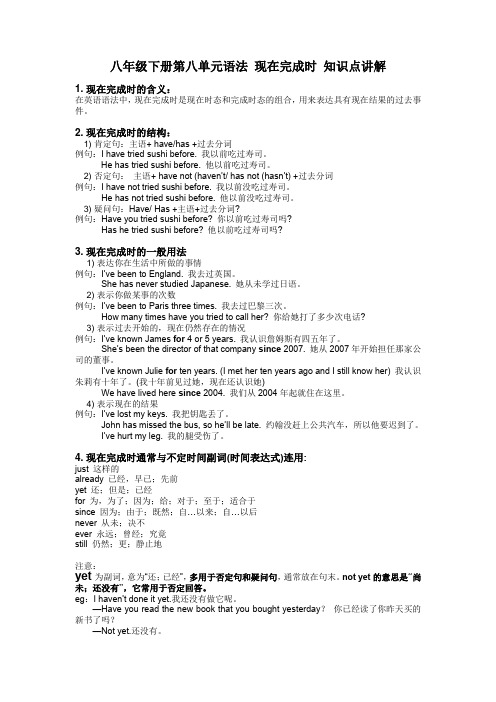
八年级下册第八单元语法现在完成时知识点讲解1. 现在完成时的含义:在英语语法中,现在完成时是现在时态和完成时态的组合,用来表达具有现在结果的过去事件。
2. 现在完成时的结构:1) 肯定句:主语+ have/has +过去分词例句:I have tried sushi before. 我以前吃过寿司。
He has tried sushi before. 他以前吃过寿司。
2) 否定句:主语+ have not (haven’t/ has not (hasn’t) +过去分词例句:I have not tried sushi before. 我以前没吃过寿司。
He has not tried sushi before. 他以前没吃过寿司。
3) 疑问句:Have/ Has +主语+过去分词?例句:Have you tried sushi before? 你以前吃过寿司吗?Has he tried sushi before? 他以前吃过寿司吗?3. 现在完成时的一般用法1) 表达你在生活中所做的事情例句:I’ve been to England. 我去过英国。
She has never studied Japanese. 她从未学过日语。
2) 表示你做某事的次数例句:I’ve been to Paris three times. 我去过巴黎三次。
How many times have you tried to call her? 你给她打了多少次电话?3) 表示过去开始的,现在仍然存在的情况例句:I’ve known James for 4 or 5 years. 我认识詹姆斯有四五年了。
She’s been the director of that company since 2007. 她从2007年开始担任那家公司的董事。
I’ve known Julie for ten years. (I met her ten years ago and I still know her) 我认识朱莉有十年了。
人教版新目标八年级下册-英语语法知识点精讲+练习
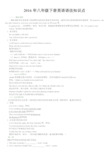
2016年八年级下册英语语法知识点(一)一般将来时一般将来时表示将来某个时间要发生的动作或者存在的状态。
通常与表示将来的时间状语连用,如tomorrow, the day after tomorrow, next year, next month, next week, in 100 years等。
be going to do (动词原形)结构:表示打算、准备做的事情或者肯定要发生的事情。
如:It is going to rain.will do 结构表示将来的用法:1. 表示预见Do you think it will rain?You will feel better after a good rest.2. 表示意图I will borrow a book from our school library tomorrow.What will she do tomorrow?基本构成如下:一般疑问句构成:(1)will+主语+do…? Will Sarah come to visit me next Sunday?(2)there be 结构的一般疑问句:Will there + be …?Will there be fewer trees? Yes, there will. / No, there won’t否定句构成:will + not (won’t)+doSarah won’t come to visit me next Sunday.特殊疑问句构成:特殊疑问词+will+主语+…?What will Sarah do next Sunday?(二)should的用法:should用来提出建议和忠告,后边加动词原形,否定句直接在should后边加not.例如:I think you should eat less junk food.我认为你应该少吃垃圾食品。
She drives a lot and she seldom walks. So I think she should walk a lot.她经常开车,很少走路。
人教新目标版英语八年级下册语法专练(含答案解析)

人教新目标版英语八年级下册语法专练学校:___________姓名:___________班级:___________考号:___________二、单项选择6.Zhao Lan________already________in this school for two years.A.was;studying B.will;study C.has;studied D.are;studying 7.They_____a football game from7to9last night.A.were watching B.watch C.watched D.are watching 8.The famous writer__________five new books since two years ago.A.is writing B.was writing C.wrote D.has written 9.—Our country______a lot so far.—Yes.I hope it will be even______.A.has changed;well B.changed;good C.has changed;better D.changed;better10.—I called you yesterday evening,but there was no answer.—Oh,I am sorry I________dinner at my friend’s home.A.have B.had C.was having D.have had 11.—Did you notice him come in?—No.I________a football game.A.have watched B.had watchedC.am watching D.was watching12.The Lion King is a very good film.I________it three times.A.will see B.have seen C.saw D.see 13.Schools_________allow students at least one hour a day for sports.14.________you tell me how to get to the post office?A.Must B.Need C.Could D.Should 15.—Could I borrow your book?—Of course,you_______.A.can B.must C.should D.will 16.—Could you please help me do my homework?—Sorry,I________.You________do it by yourself.A.could;may B.couldn’t;should C.can’t;should D.can’t;may 17.—I’m not good at physics.What shall I do?—You should work much________than before.A.hard B.harder C.hardest D.more hardly 18.The more you smile,the________you will feel.A.happy B.happier C.happily D.more happy 19.This book is________that one,but________than that one.A.as interesting as;expensive B.as more interesting as;more expensive C.as interesting as;more expensive D.as more interesting as;as expensive三、同义句转化四、单项选择23.Teresa is________nervous________she can’t talk in front of the class.A.such;that B.too;to C.so;that D.enough;to 24.The boy________to bed________his mother came back.A.went not;until B.didn’t go;after C.went;until D.didn’t go;until 25.You can't pass the exam________you study hard.A.to swim B.how to swim C.swimming D.how swim 39.________the project in time,the staff were working at weekends.A.Completing B.Having completed C.To complete D.To havecompleted40.With the rapid development of the world,we have something new________with all by ourselves every day.A.deal B.dealt C.to deal D.dealing 41.Last summer I took a lesson on________.A.how to make dresses B.how dresses be madeC.how to be made dresses D.how dresses to be made42.The house is not large enough________.A.to live in B.to be lived in C.for live D.for living 43.It’s foolish________so.A.for you to say B.of you to say C.with you saying D.in your saying参考答案:1.was doing【详解】句意:昨天晚上我回到家时,我父亲正在洗衣服。
初中英语人教新目标八年级下册 Unit 1 复习(主要短语+知识点讲解+单元语法)
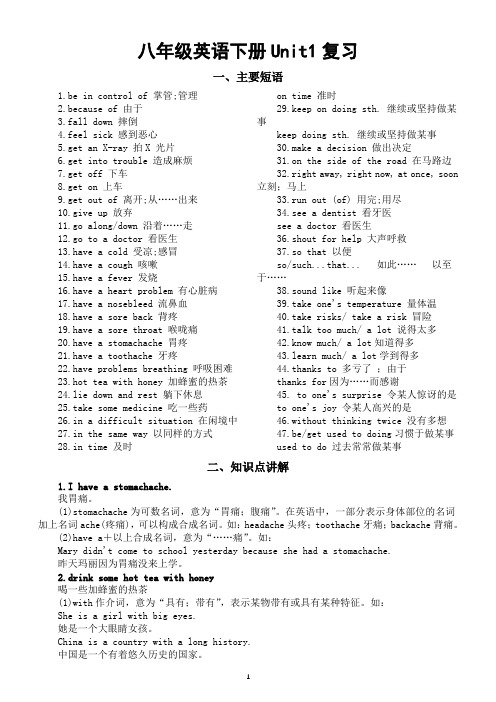
八年级英语下册Unit1复习一、主要短语1.be in control of 掌管;管理2.because of 由于3.fall down 摔倒4.feel sick 感到恶心5.get an X-ray 拍X 光片6.get into trouble 造成麻烦7.get off 下车8.get on 上车9.get out of 离开;从……出来10.give up 放弃11.go along/down 沿着……走12.go to a doctor 看医生13.have a cold 受凉;感冒14.have a cough 咳嗽15.have a fever 发烧16.have a heart problem 有心脏病17.have a nosebleed 流鼻血18.have a sore back 背疼19.have a sore throat 喉咙痛20.have a stomachache 胃疼21.have a toothache 牙疼22.have problems breathing 呼吸困难23.hot tea with honey 加蜂蜜的热茶24.lie down and rest 躺下休息25.take some medicine 吃一些药26.in a difficult situation 在闲境中27.in the same way 以同样的方式28.in time 及时on time 准时29.keep on doing sth. 继续或坚持做某事keep doing sth. 继续或坚持做某事30.make a decision 做出决定31.on the side of the road 在马路边32.right away, right now, at once, soon 立刻;马上33.run out (of) 用完;用尽34.see a dentist 看牙医see a doctor 看医生36.shout for help 大声呼救37.so that 以便so/such...that... 如此……以至于……38.sound like 听起来像39.take one's temperature 量体温40.take risks/ take a risk 冒险41.talk too much/ a lot 说得太多42.know much/ a lot知道得多43.learn much/ a lot学到得多44.thanks to 多亏了;由于thanks for因为……而感谢45. to one's surprise 令某人惊讶的是to one's joy 令某人高兴的是46.without thinking twice 没有多想47.be/get used to doing习惯于做某事used to do 过去常常做某事二、知识点讲解1.I have a stomachache.我胃痛。
初中英语人教新目标八年级下册Unit 3 SectionA预习指导(知识点+练习题)
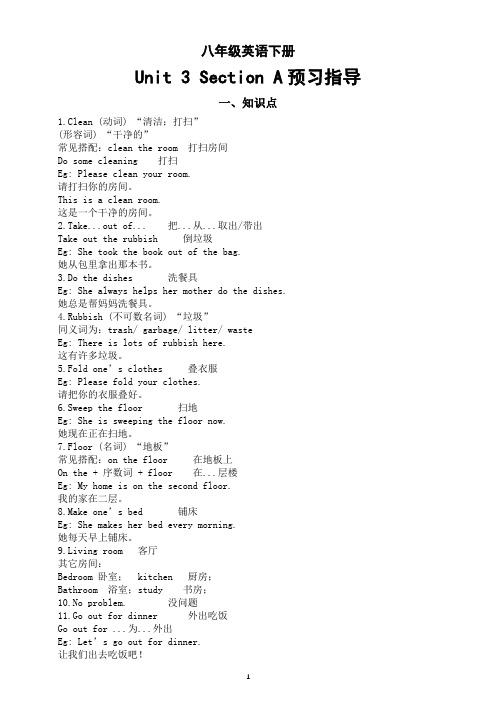
八年级英语下册Unit 3 Section A预习指导一、知识点1.Clean (动词) “清洁;打扫”(形容词) “干净的”常见搭配:clean the room 打扫房间Do some cleaning 打扫Eg: Please clean your room.请打扫你的房间。
This is a clean room.这是一个干净的房间。
2.Take...out of... 把...从...取出/带出Take out the rubbish 倒垃圾Eg: She took the book out of the bag.她从包里拿出那本书。
3.Do the dishes 洗餐具Eg: She always helps her mother do the dishes.她总是帮妈妈洗餐具。
4.Rubbish (不可数名词) “垃圾”同义词为:trash/ garbage/ litter/ wasteEg: There is lots of rubbish here.这有许多垃圾。
5.Fold one’s clothes 叠衣服Eg: Please fold your clothes.请把你的衣服叠好。
6.Sweep the floor 扫地Eg: She is sweeping the floor now.她现在正在扫地。
7.Floor (名词) “地板”常见搭配:on the floor 在地板上On the + 序数词 + floor 在...层楼Eg: My home is on the second floor.我的家在二层。
8.Make one’s bed 铺床Eg: She makes her bed every morning.她每天早上铺床。
9.Living room 客厅其它房间:Bedroom 卧室; kitchen 厨房;Bathroom 浴室;study 书房;10.No problem. 没问题11.Go out for dinner 外出吃饭Go out for ...为...外出Eg: Let’s go out for dinner.让我们出去吃饭吧!12.Go to the movies 去看电影类似词组:see the film 看电影Eg: They went to the movies last night.他们昨晚去看电影了。
- 1、下载文档前请自行甄别文档内容的完整性,平台不提供额外的编辑、内容补充、找答案等附加服务。
- 2、"仅部分预览"的文档,不可在线预览部分如存在完整性等问题,可反馈申请退款(可完整预览的文档不适用该条件!)。
- 3、如文档侵犯您的权益,请联系客服反馈,我们会尽快为您处理(人工客服工作时间:9:00-18:30)。
新目标八年级下册英语语法知识点精讲+练习(一)一般将来时一般将来时表示将来某个时间要发生的动作或者存在的状态。
通常与表示将来的时间状语连用,如tomorrow, the day after tomorrow, next year, next month, next week, in 100 years等。
be going to do(动词原形)结构:表示打算、准备做的事情或者肯定要发生的事情。
如:It is going to rain.will do结构表示将来的用法:1. 表示预见Do you think it will rain?You will feel better after a good rest.2. 表示意图I will borrow a book from our school library tomorrow.What will she do tomorrow?基本构成如下:一般疑问句构成:(1)will+主语+do…? Will Sarah come to visit me next Sunday?(2)there be 结构的一般疑问句:Will there + be …?Will there be fewer trees? Yes, there will. / No, there won’t否定句构成:will + not (won’t)+doSarah won’t come to visit me next Sunday.特殊疑问句构成:特殊疑问词+will+主语+…?What will Sarah do next Sunday?★★练一练★★根据例句,用will改写下列各句例:I don’t feel well today. (be better tomorrow)I’ll be better tomorrow.1. Gina has six classes today. (have a lot of homework tonight)_____________________________2. I’m tired now. (sleep later)_____________________________3. My parents need a new car. (buy one soon)_____________________________4. We can’t leave right now. (leave a little later)_____________________________5. The weather is awful today. (be better tomorrow)_____________________________答案:1. She’ll have a lot of homework tonight.2. I’ll sleep later.3. They’ll buy one soon.4. We’ll leave a little later.5. Maybe it’ll be better tomorrow.(二)should的用法:should用来提出建议和忠告,后边加动词原形,否定句直接在should后边加not.例如:I think you should eat less junk food.我认为你应该少吃垃圾食品。
She drives a lot and she seldom walks. So I think she should walk a lot.她经常开车,很少走路。
所以我认为她应该多走路。
Students shouldn’t spend too much time playing computer games.学生们不应当花太多的时间玩计算机游戏。
学习向别人提建议的几种句式:(1)I think you should…(2)Well, you could…(3)Maybe you should …(4)Why don’t you…?(5)What about doing sth.?(6)You’d better do sth.★★练一练★★用should或shouldn’t填空1. I can’t sleep the nig ht before exams.You ______ take a warm shower before you go to bed.2. Good friends ______ argue each other.3. There is little milk in the glass. We _______ buy some.4. They didn’t invite you? Maybe you ______ be friendlier.5. I am a little bit overweight. So I think I _______ do exercises every day.答案:1. should 2. shouldn’t 3. should 4. should 5. should(三)过去进行时过去进行时表示过去某一点时间正在进行的动作或者过去某一段时间内一直进行的动作。
1. 构成was /were + doing,例如:I was watching TV at 9 o’clock last night.at 9 o’clock last night是时间点They were playing football all afternoon.all afternoon是时间段2. 过去进行时的标志词at 8 o’clock last night, this time yesterday等。
例如:I was having lunch at home this time yesterday.昨天的这个时候我正在吃午饭。
At that time she was writing a book.那阵子她在写一本书。
(表示她在那段时间里一直在做那件事情。
)★★练一练★★用括号中所给动词的适当形式填空。
1. This time yesterday I ____ ______(read)books.2. At 9 o’clock last Sunday they ______ ______(have)a party.3. When I _____(come)into the classroom, she ________ ______(read)a storybook.4. She _____ ______(play)computer games while her mother ____ ______(cook)yesterday afternoon.5. I _____ ______(have)a shower when you _______(call)me yesterday.答案:1. was reading 2. were having 3. came; was reading4. was playing; was cooking5. was having; called(四)间接引语形成步骤:(1)不要逗号,冒号,引号(2)要考虑到人称的变化(人称的变化与汉语是一致的)(3)要考虑时态的变化(4)要考虑时间状语、地点状语和语示代词的变化。
1.2.★★练一练★★用括号中所给动词的适当形式填空。
1. She said I _____(be)hard-working.2. Peter told me he _____(be)bored yesterday.3. She said she _____(go)swimming last Sunday.4. Bobby said he _____(may)call me later.5. Antonio told me he _____(read)a book then.答案:1. was 2. was 3. went 4. might 5. was reading 请转述他人说的话:1. I go to the beach every Saturday. (Tom)2. I can speak three languages. (Lucy)3. I will call you tomorrow. (Mike)4. I’m having a surprise party for Lana. (she)(五)if引导的条件状语从句结构:if+一般现在时,主语+将来时含义:如果……,将要……例如:If you ask him, he will help you.如果你请求他,他会帮助你。
If n eed be, we’ll work all night.如果需要,我们就干个通宵。
★★练一练★★根据中文提示,完成句子。
1. 如果你参加聚会,你将会过得很开心。
If you ________ the party, you __________.2. 如果明天下雨,我们将不去野餐。
If it __________ tomorrow, we ___________.3. 如果你经常听英文歌,你将会喜欢英语的。
If you often ________, you _________________.答案:1. If you go to the party, you will have a good time2. If it rains tomorrow, we won’t go to the picnic3. If you often listen to English songs, you’ll like English二. 完形填空特点及解题思路(一)题型分类与特点完形填空试题是在给出的一篇短文中有目的地拿掉若干个词,留下一些空格,要求考生借助短文保留的部分,从所给的短文整体出发,在正确理解短文意思的基础上,根据句子和句子间的内在联系、词的用法和习惯搭配等,用适当的词或词语填空,使补全后的短文意思通顺、前后连贯、结构完整。
这种题型测试的内容从形式上看是单词或短语的填空,但它必须注意到短文中上、下文意思连贯、词语搭配和语法结构正确,所以在空格上所填的词必须符合语义适用和语法正确两条原则,只考虑某一侧面都可能导致错误。
中考中完形填空试题的基本题型分两类:完形填空选择题和完形填空题。
1. 完形填空选择题:该题型的特点是将一篇短文中若干词语抽掉留下空格,对每一空格提供若干个选择项,要求考生通读短文后,在理解短文意思的基础上,运用所学的词汇、句型、语法等语言知识,从所提供的备选项中选出一个最佳答案,使短文内容完整正确。
